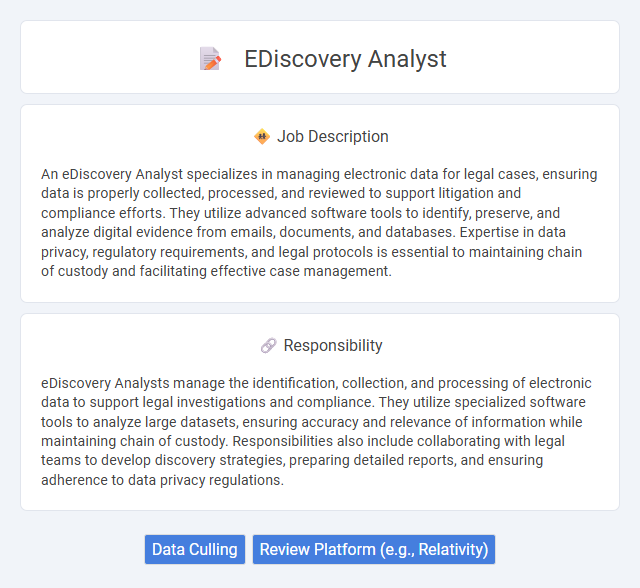
An eDiscovery Analyst specializes in managing electronic data for legal cases, ensuring data is properly collected, processed, and reviewed to support litigation and compliance efforts. They utilize advanced software tools to identify, preserve, and analyze digital evidence from emails, documents, and databases. Expertise in data privacy, regulatory requirements, and legal protocols is essential to maintaining chain of custody and facilitating effective case management.
Individuals with strong analytical skills and attention to detail are likely to thrive in an eDiscovery Analyst role, as the job often requires reviewing large volumes of digital data for legal cases. Those comfortable working with technology and managing sensitive information may find this position particularly suitable. Conversely, people who struggle with repetitive tasks or have difficulty maintaining focus under deadlines might find the demands of this role challenging.
Qualification
An eDiscovery Analyst typically requires a strong background in legal technology, data management, and compliance frameworks such as GDPR and HIPAA. Proficiency in eDiscovery tools like Relativity, Clearwell, and Concordance is essential, along with expertise in data collection, processing, and review workflows. Advanced analytical skills, attention to detail, and the ability to interpret large data sets for legal relevance are crucial qualifications for this role.
Responsibility
eDiscovery Analysts manage the identification, collection, and processing of electronic data to support legal investigations and compliance. They utilize specialized software tools to analyze large datasets, ensuring accuracy and relevance of information while maintaining chain of custody. Responsibilities also include collaborating with legal teams to develop discovery strategies, preparing detailed reports, and ensuring adherence to data privacy regulations.
Benefit
An eDiscovery Analyst role likely offers significant benefits including enhanced expertise in legal technology and data management, increasing career marketability. The position may provide opportunities to work cross-functionally with legal, IT, and compliance teams, expanding professional networks and skills. Employees could experience improved problem-solving capabilities through handling complex data sets and supporting litigation processes.
Challenge
The role of an eDiscovery Analyst likely presents challenges related to managing vast amounts of digital data while ensuring compliance with legal and regulatory standards. Navigating complex software platforms and rapidly evolving technologies may require continuous learning and adaptation. Tight deadlines and the need for meticulous attention to detail could further increase the job's difficulty and demand high levels of focus and organization.
Career Advancement
An eDiscovery Analyst plays a crucial role in managing electronic data for legal cases, utilizing advanced tools like Relativity and Clearwell to streamline document review and data processing. Career advancement opportunities include progressing to roles such as eDiscovery Project Manager, Data Analyst, or Litigation Support Specialist, with increasing responsibility in case strategy and data analytics. Gaining expertise in legal technology platforms and certifications like ECEDS enhances prospects for leadership positions and specialized consulting roles within law firms and corporate legal departments.
Key Terms
Data Culling
eDiscovery Analysts specialize in data culling by efficiently filtering large datasets to identify relevant electronically stored information (ESI) for legal cases. They utilize advanced analytics, keyword searches, and predictive coding to reduce data volume while maintaining crucial evidence integrity. Mastery of data culling techniques enhances the accuracy and speed of legal discovery processes, minimizing costs and risks associated with data management.
Review Platform (e.g., Relativity)
An eDiscovery Analyst specializes in managing and analyzing electronic documents using review platforms like Relativity to streamline legal review processes. Proficiency in Relativity enables accurate data culling, keyword searching, and metadata analysis, ensuring efficient case preparation and regulatory compliance. This role demands strong technical skills to configure review workflows and extract critical evidence from large datasets.
 kuljobs.com
kuljobs.com